Mikan Watch #106: Love Live Sunshine
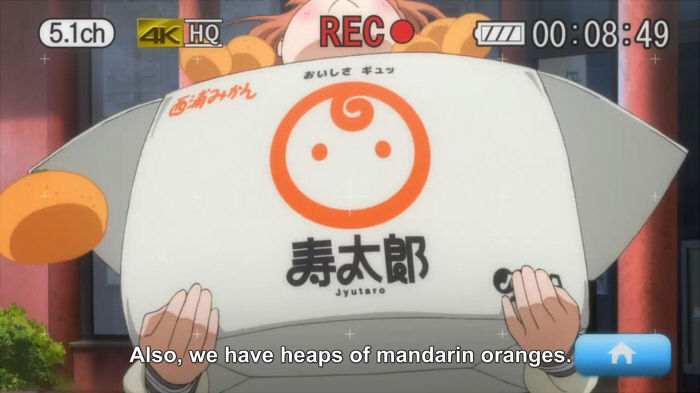
From episode 6 here, mostly because they somewhat bring attention to the fact, though one appears as early as the shows first episode, used there as a soap-box for Chika trying to recruit potential idol candidates.
I’ve not really been intending to write about Love Live Sunshine – and certainly not in the way I did about the original Love Live. This isn’t so much about the quality of the show as it is the environment in which it exists – somewhere between the first and second seasons of the original Love Live the global fandom for it exploded to the point where folks with way, way more investment in it than I have the time or energy to muster are paying attention to it. There’s really not much point at this stage of me trying to pick it apart or anything, as there’s plenty more informed folks on forums the internet-over doing that already.
Admittedly, the fact that I’ve been away from home most weekends this season doesn’t really help with even just keeping up with the show, particularly when “away from home” also means “out of the UK” given the streaming situation with the show – there’s not really any way of me actually being able to watch it when I’m in a hotel in the US, and the only reason I even saw the first episode in a prompt fashion was because I was at the Aqours event as Anime Expo.
Anyway, Love Live Sunshine is essentially fine. Much like the original Love Live, it’s largely at it’s best when it’s allowing itself to be a dumb comedy, though it’s maybe hitting it’s other notes a little less overbearingly than it’s predecessor.
That is when it’s not feeling the need to cast allusions to the story of μ’s, anyway. I mean, it’s a little too easy to put a little too much focus on studios when most of them aren’t necessarily that stable in terms of staff, but being weirdly meta-textual about it’s content has been in Sunrise 8s DNA at least as far back as the original My-HiME, so the kind of approach being taken with this show probably shouldn’t really have been that much of a surprise in retrospect.
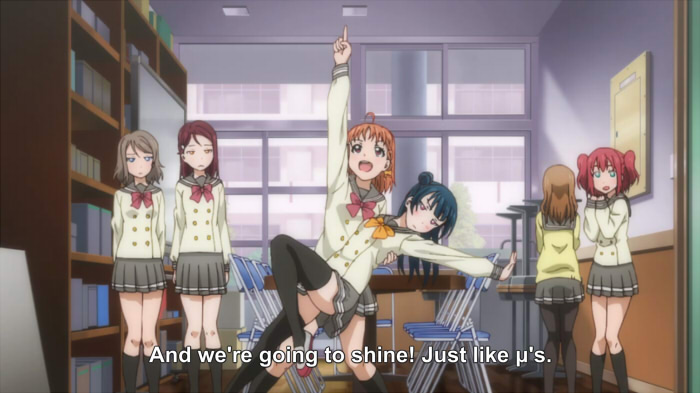
Honestly, the main issue I personally have isn’t even so much that it’s doing it, more that it feels like it’s doing a disservice to the rest of what the show is actually delivering. Acknowledging that the show is set in a post-μ’s world is actually a wonderful thing, and any attempts to compare the Sunshine cast to members of μ’s in-universe tends just to highlight how different individual members are to the specific objects of their admiration (though there’s probably a point about media portrayal of someone’s personality versus how they actually are there somewhere – I’d kind of like to hear the Aqours members impressions of Nico at some point).
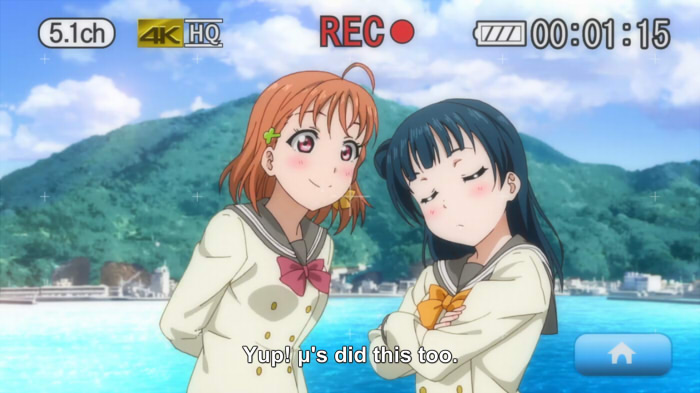
Where things get weird is when you jump to the layer above that, where the staff seems to feel like they need to constantly reuse plot elements from the same episode number of the original Love Live, even if they do tend to invert them in cute ways. It’s often at best seemed cynical, and at worst lazy, though the lat couple of episodes have probably given the actual game behind them doing this away.
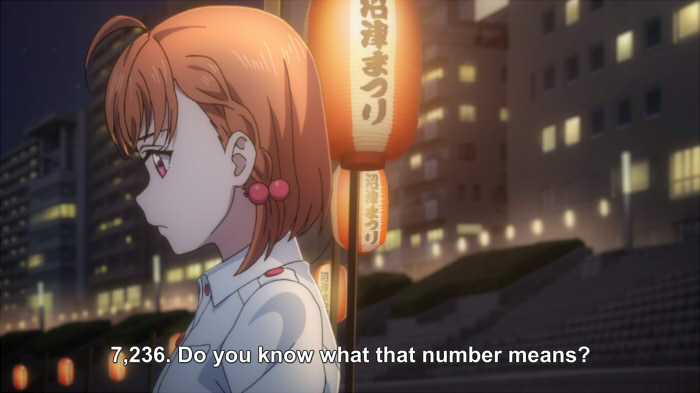
I mean, there’s a bunch of stuff to unpack in this weeks eighth episode alone. This isn’t the first time the show has referenced the fact that the number of School Idol units has increased exponentially since the events of the original series of Love Live. As much as the original Love Live itself came across as some unholy multi-media mix throwing the marketing concepts of iM@S and K-On together, with a dash of audience participation, itself, it very much was riding at the front of an idol wave it certainly had a big part in creating. Sunshine, on the other hand, comes into a world where things like WUG, Aikatsu, PriPara, Toyko7thSisters, or BanG Dream exists, where Hiroshi Nishikiori tried to Kickstart Chika*Chika Idol, and where Kodansha has someone at Otakon promoting the fact that they’re trying to do a Virtual Reality cartoon idol franchise partially inspired by Love Lives success (though the producer did say that he considers episode 19 of Cinderella Girls the pinnacle of anime, so he can’t be all bad). The token idol character in every other kind of show is probably the most normalised it’s ever been at the moment.
The general point is that, much like the Aqours characters exist in a world of exploded competition, so do Aqours the voice actress and idol group.
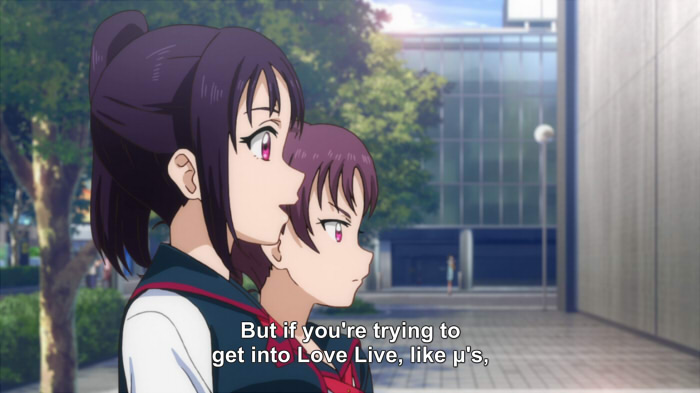
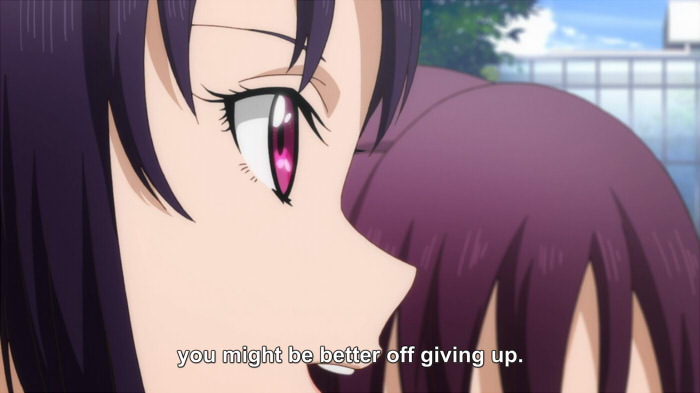
Which, aside from the fact that it’s a little rich being delivered by a unit that looks enough like a pair of Nico cosplayers that I was wondering if one of them was her sister when they first appeared, makes this kind of line being delivered rather deliciously meta in the kind of way I particularly enjoy, and re-contextualises much of what has happened prior in the series in a fashion that makes it much more obvious what they were probably trying to go for, and much easier to appreciate.
The point is that the game has changed. Everyone knows about μ’s, and everyone is trying to imitate that success. This is as true outside of the universe of the series as it is within it, of course. Admittedly, being linked to the Love Live franchise gives the real-life Aqours a massive leg-up on the competition, but the fact that just being a carbon copy of their predecessors is likely to result in only short-term interest would likely be true regardless.
In universe, though, the events of these episodes mark an important segregation point. Up until this point, the characters thought that μ’s were the pinnacle of the School Idol universe. They were the thing to be chased. It was who they were imitating, and what the events were paralelling. The reality is that, outside of their sleepy town, unbeknownst to them, their idols had instead become the baseline. Everyone knows about μ’s and A-RISE at their peaks, and everyone knows how imitate them. There’s nothing special about doing that, and it’ll get you literally nowhere. You have to be at least μ’s to be worthwhile.
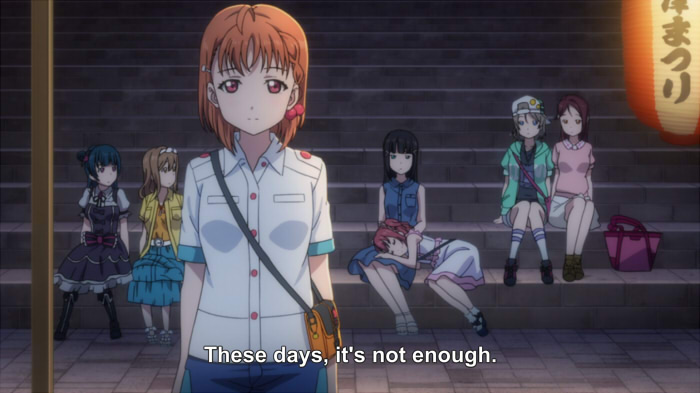
Which is going to make the next few episodes interesting, as the characters have to start mapping a course beyond their heroines. Admittedly, at this point it’s set itself up for a very different kind of end-of-cour drama to it’s predecessor anyway, with it’s third-year personal idol-trauma issues instead of the honestly kind-of-dumb Kotori-flies-the-coup shenanigans the original was starting to frame around this point, but unless the show is going out of it’s way to be really obnoxious and contradictory about itself, it should be very much marking out it’s territory as it’s own entity going forward. I mean, it’d be more than a bit rich if next weeks episode ended up being about how Akiba is secretly the most wonderful bestest place ever after the show itself made such an explicit point about how just being μ’s isn’t really acceptable.
Right?
(It probably won’t surprise anyone to learn that Yoshiko/Yohane is probably my favourite character in the show. There’s probably some argument to be made about it being a cute inversion of Nico’s obsession with stage persona’s to some degree, but it results in a certain unusual sense of self-consciousness that’s not-entirely common for chuuni-cartoon idols that’s amusing, if sometimes forgotten in the cause of a good gag).

2016-08-25
#
But Akiba is the greatest, most wonderful place evah! Still it’s nice to know how meta the Love Live franchise can get. Watched far too many original Sunrise shows to know what they are up to.